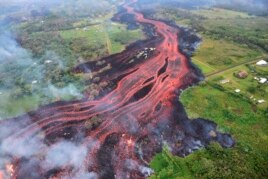22 May, 2018
Volcanic activity on Hawaii's Big Island is keeping many travelers and their money away from the island.
Cruise ship operators have canceled planned stops on the Big Island. Hotels there expect many of their rooms to sit empty this summer, even with price cuts.
Many people work in the island's tourism industry. They depend on the 2 million visitors who travel each year to Hawaii Volcanoes National Park. They are now wondering how long their families will survive without a way to earn money.
Tourism officials say summer reservations for hotels on the Big Island have dropped almost 50 percent since Kilauea Volcano began erupting on May 3.

In this Saturday, May 19, 2018, photo released by the U.S. Geological Survey, lava flows from fissures near Pahoa, Hawaii.
Hawaii Volcanoes National Park is the state's top stop for tourists. Its closure is costing the island $166 million, the U.S. National Park Service reported Monday.
A park service report said the total amount of money lost grows to $222 million when officials include the almost 2,000 jobs indirectly affected by park tourists.
Tourism is the Big Island's largest industry and employer. The Hawaii Visitors Bureau says it provided more than 30 percent of non-government jobs in 2017.
Erik Storm's travel company, called EcoGuides, leads tours of Hawaii Volcanoes National Park. The business stopped operations a month ago when volcanic conditions made it too dangerous to visit.
"We have a family to support so we hope that the National Park will reopen again soon, otherwise this could have a serious impact on our life," he said.
Tourists frightened by liquid rock
The volcano has showed no signs of slowing down. Scientists say the current series of eruptions is among the worst events in a century from one of the world's most active volcanoes. In 1955, a series of eruptions from Kilauea lasted 88 days. It has been releasing lava and poisonous gas since 1983.
Possible visitors to the Big Island have been frightened by images of lava burning homes and soldiers wearing protection over their faces. More recent pictures showed deadly white clouds of acid and glass particles, as the liquid rock flows into the Ocean.

Lava flows into the Pacific Ocean, southeast of Pahoa, during ongoing eruptions of the Kilauea Volcano in Hawaii, U.S., May 20, 2018.
Kilauea's lava flows are in a relatively small area. However, the volcano has harmed tourism across the island, which is home to 200,000 people.
Beverly Oka works at Uncle Billy's Kona Bay Hotel, about 193 kilometers west of the lava flows. She says reservations at the hotel for the summer months are about 40 percent lower than normal.
"We are not affected. We have some vog, but not more than usual," said Oka. The term vog is short for volcanic smoke mixed with fog, which blows from Kilauea. Oka's hotel is offering a 30 percent cut in prices to try to increase business.
Norwegian Cruise Line has ordered its cruise ships not to stop at the Big Island because of dangerous conditions. Royal Caribbean Cruises also canceled a planned stop at Hilo, the island's largest city. Hilo is about 32 kilometers northeast of the volcano.
Rob Guzman and his husband fled their guest-house rental business just 10 km from the lava flow. They were worried about the ground shaking from the eruptions, clouds of sulfur dioxide gas and roads being closed.
"We've lost more than half of our household income and many other people will be in the same situation indefinitely," said Guzman, who is staying with friends north of Hilo.
I'm Phil Dierking.
Jolyn Rosa and Andrew Hay wrote this story for the Reuters news service. Phil Dierking adapted their story for VOA Learning English. George Grow was the editor.
Have you had a trip canceled because of natural disasters? Write to us in the Comments Section or on 51VOA.COM.
_____________________________________________________________
Words in This Story
acid - n. a chemical with a sour taste that forms a salt when mixed with a base
cruise - n. to travel on a boat or ship to a number of places as a vacation
erupt - v. to send out rocks, ash, lava, etc., in a sudden explosion
impact - v. to have a strong and often bad effect on
income - n. money that is earned from work, investments, business, etc.
lava - n. melted rock from a volcano
otherwise - n. in a different way or manner
reservation - n. an arrangement to have something (such as a room, table, or seat) held for your use at a later time